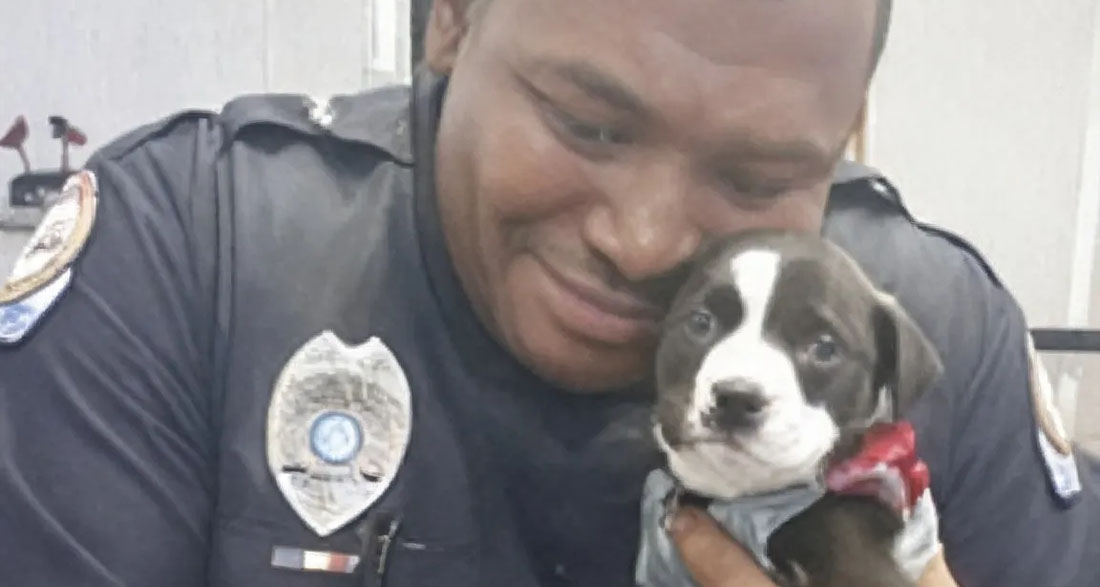The call came in like so many others—just another routine report. “A puppy’s been found shaking behind a dumpster,” said the control center. Officer Marcus Hayes let out a long sigh. He’d already spent ten straight hours running from one stressful call to another—arguments between neighbors, a stolen bike, a shoplifting teen. Now a stray dog? It was the last thing he wanted to deal with.
Still, orders were orders.
As his patrol car turned into the narrow back alley off 5th Street, Marcus braced himself. He expected to find what he always did in cases like this—a frightened, abandoned little creature left to fend for itself. Rain had started falling again, turning the narrow alley into a slippery mess of puddles and trash. He clicked on his flashlight and swept the beam across the shadows.
That’s when he saw her.
A tiny dog, soaking wet, was curled up tight against a cold brick wall. Her fur clung to her body, and she wore a torn blue sweater that barely stayed on. She looked up at him, shivering but silent, as if she wasn’t sure if she should be scared or hopeful.
Marcus stepped forward slowly, crouched down, and scooped her up into his hands. She was so small, she barely filled his palms. As soon as she felt the warmth of his chest, she let out a soft whimper and burrowed into him.
And something happened.
All the tiredness, the anger, the frustration he’d been carrying melted away. Holding that little dog, Marcus felt something he hadn’t felt in years—peace. In that moment, the hard edge he’d developed over twelve years on the job began to soften.
He spoke into his radio, but his voice was trembling. “Officer Hayes to control,” he said. “I’ve located the dog. She’s coming home with me.”
“Say again?” the dispatcher replied, clearly confused.
“I said… she’s coming home with me.”
He didn’t care about the shocked chatter that followed back at the station. He couldn’t look away from those big brown eyes staring up at him. Eyes that were still full of hope, despite everything. Eyes that reminded him why he’d become a police officer in the first place—not just to enforce rules, but to make a difference, even in the smallest of ways.
Back at the station, his fellow officers were stunned. Detective Ramirez raised an eyebrow as she watched Marcus wrap the puppy in his spare uniform shirt. “You do know this isn’t in our job description, right?”
“I know,” Marcus replied, his voice steady now. “But just look at her. Someone’s got to give her a shot.”
He looked around at his teammates. “Isn’t that what we’re supposed to do? Give people—animals too—a second chance?”
The next day, after working with Animal Control and getting her checked by a local vet, Marcus officially adopted the little pup. He named her Hope.
Hope. Because that’s exactly what she’d given him.
His wife, Elena, cried happy tears when she saw the puppy curled up in a blanket on their couch. She hugged Marcus tightly, whispering, “She’s perfect.”
Their teenage daughter, Sofia, fell in love instantly. Within a few days, the once-timid pup had become a curious, playful explorer who followed Marcus everywhere—around the house, down the street, even to work.
Before long, Hope became a regular in Marcus’s patrol car. She’d sit proudly in the passenger seat, ears perked, looking out at the world like she was born for this. The community loved her. Kids would wave as they walked by. Shopkeepers left treats on their counters just in case Marcus stopped in.
People who used to avoid the police now walked up to say hi—just to pet Hope.
But not everyone was thrilled.
Mrs. Thompson, the no-nonsense president of the neighborhood council, did not approve. Her hedges were always perfectly trimmed. Her grass was cut at exact angles. And now, there was a dog—yes, a dog—in a police cruiser?
At the next council meeting, she slammed a newspaper onto the table, pointing at a photo of Marcus and Hope on patrol.
“This,” she snapped, “is completely unacceptable! This so-called ‘community policing’ has gone too far. Stray animals have no business on public roads or inside official police vehicles!”
Some members nodded along with her, the kind who cared more about clean sidewalks than compassionate officers. A petition started making rounds, demanding that Hope be removed from duty. And one day, an anonymous complaint landed on the police chief’s desk.
Marcus was called in.
He sat quietly as his chief laid out the complaint. If he continued bringing Hope to work, there could be consequences. A warning. Maybe worse.
He left the meeting with a heavy heart.
But something strange began happening on his patrols. People who used to ignore him started waving. Kids came up to say hi. Strangers handed him coffee or treats for Hope. One shopkeeper said, “Business is up. People walk past just to see the dog.”
A teenage girl who had once run from police now came over to scratch behind Hope’s ears and ask Marcus about becoming a vet.
One rainy afternoon, as Marcus sat in his car reading letters of support that had started arriving from all over the town, a little boy knocked on the window.
“Excuse me, Officer,” the boy said shyly. “My mom told me to give you this.”
He handed Marcus a folded piece of paper. In neat handwriting, it read:
“Thank you for showing our neighborhood that kindness matters. Hope reminds us what happens when compassion wins over rules.”
Marcus swallowed hard. He looked at Hope curled up beside him, wagging her tail.
He made a decision.
That evening, he drove to the park, sat on a bench with Hope, and watched families playing together. He saw parents pushing swings, couples walking hand in hand, teenagers laughing on the grass. The town felt… whole.
The next week, he met with the police chief and local council. He laid out a new plan.
The “Hope Community Connection Program.”
Instead of random patrols, Marcus suggested organized visits. Hope and he would stop by schools, senior centers, libraries, and local parks. People could meet the officer and his dog, ask questions, feel safe.
At first, Mrs. Thompson rejected the idea outright.
But Marcus invited her to one of the visits.
She reluctantly came. And what she saw changed everything.
At a senior home, she watched a woman with advanced dementia—who hadn’t spoken in weeks—smile and whisper “puppy” as Hope climbed gently into her lap. A gruff man in a wheelchair broke into tears, saying Hope reminded him of the dog he lost years ago.
Even Mrs. Thompson’s hard stare began to melt.
Within weeks, the program exploded in popularity.
Other officers joined, some with their own pets, others with certified therapy dogs. The neighborhood council, now chaired by a friendlier Mrs. Thompson, helped raise money. Local businesses donated supplies. A nearby vet clinic offered free health checkups for all program dogs.
Hope became a local celebrity. Other towns copied the program. The bond between police and community began to grow—stronger than it had been in years.
Crime even dropped.
People were no longer afraid to approach officers. They talked, they asked questions, and they reported concerns. Trust bloomed.
Marcus often looked at Hope and thought, I didn’t save her—she saved me.
That tiny, soaking-wet puppy behind a dumpster had reminded him of what really mattered: compassion, connection, and courage.
Sometimes, the smallest act of kindness can change everything.
Hope did exactly that.
And in doing so, she changed not just one man’s life, but an entire community’s heart.














